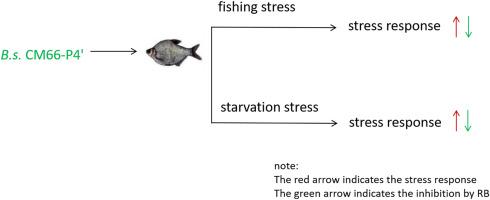表达功能肽的重组枯草芽孢杆菌及其对两种应激状态下的钝口鳊鱼(Megalobrama amblycephala)的影响。
IF 3.9
2区 农林科学
Q1 FISHERIES
引用次数: 0
摘要
本研究通过体外和体内实验研究了重组枯草芽孢杆菌CM66-P4'(分泌P4,与本实验室以前的研究有关)对钝口鳊抗氧化能力和免疫功能的影响。培养实验分为 3 组,包括对照组(CG,不添加细菌)、原菌组(OBG,添加 2×109 CFU/kg 枯草芽孢杆菌 CM66)和重组菌组(RBG,添加 2×109 CFU/kg 枯草芽孢杆菌 CM66-P4')。喂养 8 周后,对部分鱼进行捕捞应激试验,其余鱼进行饥饿应激试验。采集血液样本用于测定免疫和应激相关指标。将肝细胞分为对照组(CG)和 P4 肽实验组(LTG 和 HTG)。饥饿处理后收集细胞,检测相关基因的表达。结果表明:与 CG 组相比,LTG 组和 HTG 组肝细胞 hsp60 和 hsp70 的基因表达在饥饿应激 24 h 后明显受到抑制(P < 0.05)。饥饿 30 天后,OBG 组的 MDA 含量、AKP 和 ALT 活性均有明显变化(P < 0.05),而 RBG 组的这些指标无明显变化。CG组和OBG组的血浆皮质醇、丙二醛(MDA)和免疫球蛋白M(IgM)在捕捞应激后4 h发生明显变化(P < 0.05),而RBG组的指标没有明显变化。总之,本研究证实枯草芽孢杆菌 CM66-P4' 在预防应激对水产家畜的不良影响方面具有巨大潜力。本文章由计算机程序翻译,如有差异,请以英文原文为准。

Recombinant Bacillus subtilis expressing functional peptide and its effect on blunt snout bream (Megalobrama amblycephala) in two state of stress
This study was conducted to investigate the effects of recombinant Bacillus subtilis CM66-P4' (secreting P4, which related to previous research in this laboratory) on the antioxidant capacity and immune function of blunt snout bream (Megalobrama amblycephala) through in vitro and in vivo experiment. The culture experiment was divided into 3 groups, including control group (CG, with no additional bacteria), original bacteria group (OBG, with 2 × 109 CFU/kg Bacillus subtilis CM66) and recombinant bacteria group (RBG, with 2 × 109 CFU/kg Bacillus subtilis CM66-P4′). After 8 weeks of feeding, a part of the fish were subjected to fishing stress, and the rest were subjected to starvation stress test. Blood samples were collected for the determination of immune and stress-related indexes. The hepatocytes were divided into control group (CG) and experiment group with P4 peptide (LTG and HTG). The cells were collected after starvation treatment and the expression of related genes was detected. The results showed as follows: compared with the CG group, the gene expressions of hepatocytic hsp60 and hsp70 in the LTG and HTG groups were significantly suppressed after 24 h starvation stress (P < 0.05). The content of MDA, the activities of AKP and ALT in OBG group were significantly changed after 30 days starvation (P < 0.05), while the indexes in RBG group had no significant change. The changes of plasma cortisol, malondialdehyde (MDA) and Immunoglobulin M (IgM) in CG and OBG groups were significantly changed at 4 h after fishing stress (P < 0.05), while the indexes in RBG group was not. In conclusion, this study confirmed that Bacillus subtilis CM66-P4′ has great potential in preventing adverse effects of stress on aquatic livestock.
求助全文
通过发布文献求助,成功后即可免费获取论文全文。
去求助
来源期刊

Fish & shellfish immunology
农林科学-海洋与淡水生物学
CiteScore
7.50
自引率
19.10%
发文量
750
审稿时长
68 days
期刊介绍:
Fish and Shellfish Immunology rapidly publishes high-quality, peer-refereed contributions in the expanding fields of fish and shellfish immunology. It presents studies on the basic mechanisms of both the specific and non-specific defense systems, the cells, tissues, and humoral factors involved, their dependence on environmental and intrinsic factors, response to pathogens, response to vaccination, and applied studies on the development of specific vaccines for use in the aquaculture industry.
 求助内容:
求助内容: 应助结果提醒方式:
应助结果提醒方式:


